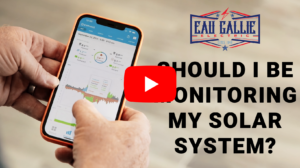Eau Gallie Electric Solar & Clean Energy Solutions
Should I Monitor My Solar System?
In recent years, there has been a surge in the number of households and businesses installing solar panels to generate their own electricity. Solar energy is an excellent way to reduce carbon emissions and save money on energy bills. However, it is important to monitor your solar system to ensure that it is working efficiently and effectively. Here are some reasons why monitoring your solar system is important:
Maximizing Energy Production
The primary reason for installing a solar system is to generate energy, so it is essential to ensure that your system is producing as much energy as possible. By monitoring your solar system, you can identify any issues that may be affecting its performance, such as shading, module damage, or a faulty inverter. Addressing these issues promptly can help you maximize the energy production of your system.
Detecting Potential Problems
A solar system is a complex network of components that must work together seamlessly to generate energy. Over time, some components may degrade or fail, which can impact the performance of your system. Regular monitoring can help you detect potential problems before they cause significant damage or system failure. By addressing these issues promptly, you can avoid costly repairs and ensure that your system continues to generate energy reliably.
Improving Energy Efficiency
Monitoring your solar system can also help you identify areas where you can improve energy efficiency. For example, if you notice that your energy production is lower than expected, you may be able to adjust your energy usage patterns or make changes to your system to improve its efficiency. By optimizing your energy usage, you can reduce your energy bills and maximize the benefits of your solar system.
Ensuring Safety
Solar systems generate electricity, which can be dangerous if not handled properly. By monitoring your system, you can ensure that all components are functioning correctly and that there are no safety hazards. For example, a faulty inverter could pose a fire risk, while damaged cables could cause electric shock. By monitoring your system, you can identify and address these hazards before they cause harm.
In conclusion, monitoring your solar system is essential to maximize energy production, detect potential problems, improve energy efficiency, and ensure safety. Regular monitoring can help you optimize the performance of your system, reduce energy bills, and extend the lifespan of your solar panels. If you have a solar system, make sure to monitor it regularly or hire a professional to do it for you.

